【2018年秋季课程人教版高三英语】选修七第五单元教案-教学文档
人教版高中英语选修7unit5课件学习教案

第五页,共58页。
Cambridge
第5页/共57页
第六页,共58页。
麻省理工学院 Massachusetts Institute of Technology
世界(shìjiè)理工大学 第6页/共57页 之最
第七页,共58页。
耶鲁大学(yē lǔ dà xué) Yale University
the country better. 4. Help us to be independent.
第12页/共57页
第十三页,共58页。
Disadvantages
1. Be difficult for us to communicate
with the foreign people and we should
True or False
1. Xie Lei came to the university to
complete a science qualification.
F
2. At first, Xie Lei didn’t get used to the
life in London, now she gets used to it.
_a__m_o_r_e_a_u_t_o_n_o_m_o_u_s__le_a_r_n_e_r ______now..
第27页/共57页
第二十八页,共58页。
➢ 语法(yǔfǎ)填空
第28页/共57页
第二十九页,共58页。
➢ Six months ago Xie Lei boarded a
for
plane___ london to complete a business
adapt to the situation quickly. 2. Cost a lot of money. 3. Miss our homes, miss our parents
人教版高中英语选修7Unit5Travelling abroadPeriod 2 教案

高中英语 Unit5 Travelling abroad Period 2优秀教案新人教版选修7Teaching objectives 教学目标1.Language aimsThe students will be able to:(1)Write and use words and expressions freely and correctly.(2)Learn the writing style of the passage.2.Ability aimsThe students will be able to:(1)Discuss some problems in English and exchange their ideas.(2)Learn how to deal with the problems that they would face when studying in a foreign country.(3)Write a short reply letter,telling something about Xie Lei's life and study in London to her friends in China.(4)Use their imagination,according to Xie Lei's life and study in London,write a short composition about a foreign student studying Chinese in China.3.Emotional aimsStudents will be able to learn the ability of facing the difficulties,analyzing the reasons,overcoming and solving the problems by themselves.Students also study hard and love our motherland to make our motherland become prosperous and strong.Teaching important and difficult points教学重难点Students will be able to summarize the benefits and difficulties of living in a foreign country.Teaching methods教学方法Task-based method;discussing;brainstorming and speakingTeaching aids教学工具(1)A blackboard(2)A projector and a computerTeaching procedures教学过程Step 1Revision and lead-inActivity 1(1)联系实际导入新课T:What was the slogan for Beijing Olympics?Ss:One world one dream.T:Yeah,the world is becoming smaller and smaller.During the Beijing Olympics,many foreigners visited China.As a Chinese,would you like to travel or study abroad?(2)Come to the new unit—Unit 5Travelling abroad(3)Ask the students if they still remember the topic about travelling we have learnt in Book 1.Talk about travelling freely.设计意图:通过联系生活实际导入新课,引出本单元话题——Travelling,实际这也是学生感兴趣的话题,这样能调动课堂气氛,使学生更容易进入状态。
人教版高中英语选修7优秀教案Unit5Travelling abroadPeriod 5新
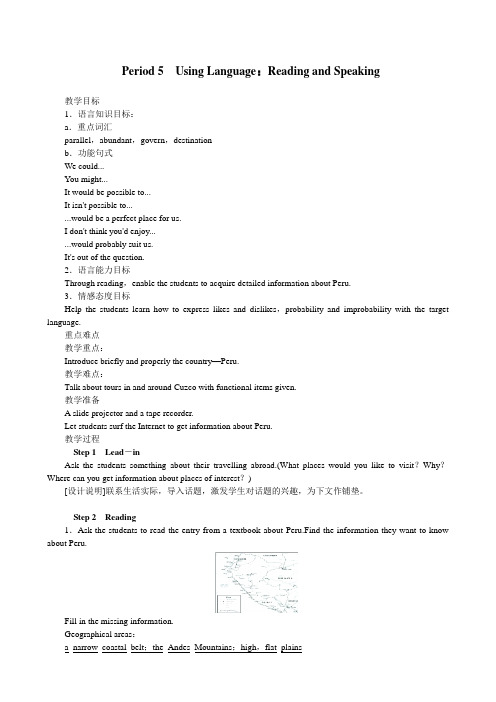
Period 5Using Language:Reading and Speaking教学目标1.语言知识目标:a.重点词汇parallel,abundant,govern,destinationb.功能句式We could...You might...It would be possible to...It isn't possible to......would be a perfect place for us.I don't think you'd enjoy......would probably suit us.It's out of the question.2.语言能力目标Through reading,enable the students to acquire detailed information about Peru.3.情感态度目标Help the students learn how to express likes and dislikes,probability and improbability with the target language.重点难点教学重点:Introduce briefly and properly the country—Peru.教学难点:Talk about tours in and around Cuzco with functional items given.教学准备A slide projector and a tape recorder.Let students surf the Internet to get information about Peru.教学过程Step 1Lead-inAsk the students something about their travelling abroad.(What places would you like to visit?Why?Where can you get information about places of interest?)[设计说明]联系生活实际,导入话题,激发学生对话题的兴趣,为下文作铺垫。
人教版高中英语选修7教案Unit Five Travelling abroa1

人教版高中英语选修7教案Unit Five Traveling Abroad本单元中心话题是“出国旅游”, 课文始终围绕这一主题展开。
旨在通过单元教学, 旨在使学生了解在国外旅行或学习时可能遇到的一些问题, 并学会怎样去解决问题. 要求学生学会表达和支持个人观点, 能用所学的有关出国旅游的词汇描述在国外居住生活的情况, 在出国旅游时能根据所给的信息选择恰当的旅游线路. 语法方面要求学生会正确使用非限定性从句.核心词汇: autonomous自主的, 自治的, 独立的; routine常规, 日常事务, 通常的, 例行的; bark; substitute代替者, 代替品, 用….代替; visa签证; destination目的地; motherland祖国; enterprise事业, 事业心; recommend推荐, 建议; agent代理, 经纪人; drill钻孔, 钻机; parallel平行的, 相同的, 类似的; draft草稿, 草案, 草拟, 起草; battery; idiom习语, 成语; videophone可视电话; queue队列, 行列, 排队; lecture演讲, 讲座; seminar专题研讨会; tutor导师, 助教, 家庭教师; essay文章, 散文; occupy占用, 占领; academic学术的, 学校的; cafeteria自助食堂, 自助餐厅; optional可选择的, 随意的; numb麻木的, 失去知觉的;词汇拓展: qualification资格, 资历; qualify使具有资格; qualified有资格的; preparation准备, 预备; prepare; prepared准备好的; comfort安慰; comfortable舒适的; requirement需要, 要求; require需要, 要求, 命令; acknowledge承认, 确认, 答谢; acknowledgement承认, 确认, 答谢; apology; apologize; contradict反驳, 驳斥; contradiction矛盾, 反驳; contradictory相矛盾的; abundant丰富的, 充裕的; abundance大量, 丰富, 充裕; govern统治, 支配, 管理; government政府; governor统治者, 管理者;重点短语: be numb with shock惊得发呆; day in and day out日复一日; adjust to适应, 调节; a variety of各种各样的; fit in相适应, 相融和; bachelor’s degree学士学位; take up对….产生兴趣, 开始喜欢, 开始花时间从事, 接受挑战, 展区时间或空间; out of the question不可能的, 不值得讨论的; travel agent旅行代办人或代理人; keep it up保持优秀成绩, 继续干下去; as far as one is concerned就…..而言; be occupied with忙着做…., 忙于某事; settle in安顿下来;重点句型:“It’s not just study that’s difficult. You have to get used to a whole new way of life, which can take up all your concentration in the beginning,”explained Xie Lei, who had live all her life in the same city in China.I have been so occupied with work that I haven’t had time for social activities.主要语法: 定语从句(非限定性从句)Period One Warming up and Reading Task Teaching goals:Talk about traveling or living in another country.Enable the students to discuss what they would learn when traveling or living in another country.Discuss the problems and dangers that could happen while traveling in a foreign country and the solution.Teaching important points:Train students’ speaking abilityTrain students’ reading abilityTeaching difficult points:How to deal with the problems that are likely to happen when traveling and how to prevent themStep 1 Warming upShow the beautiful scenery of other countries to attract students’attention, including Taj Mahal, the Pyramids of Egypt, London Bridge, Sydney Opera House, Eiffel Tower, Statue of Liberty, Stonehenge, New Zealand, South America, etc.Questions:1) Are you eager to travel abroad to enjoy the beautiful scenery by yourself?2) If you could go anywhere in the world, which country would you like to visit and why?3) What kind of things would you learn by being a tourist in a country and what would you learn best by working or studying there?(Suggested answers: architecture; places of interest; the economic situation; manners and customs; the proprieties of the country; slang; the differences in time, food, transportation; destinations; route;) Step 2 Reading taskSo, in strange surroundings, any unexpected things may happen. Now, turn to Page 82, try to list the dangers and problems, then discuss ways you could prevent theses things happening in groups.1. What problems did each traveler have? Did you guess correct? What2. Work with a partner. Complete the advice to travelers.1) When changing plans, __________________________________.2) If you have to take special medicine while traveling overseas, _______.3) If traveling alone, ____________________________________.4) When traveling, always wear ____________________________.Step 3 Homework1) Learn the new words and expressions by heart.2) Let students talk about their experiences of traveling.Period two Reading语言知识目标:1)学生能正确运用以下单词: lecture; recommend; preparation; comfort; academic; requirement; acknowledge; occupy; contradict; substitute;2)掌握下列词组的意思并能在句子中熟练运用: keep it up; fit in; get / be used to; as far as one is concerned; be occupied with;语言技能目标:学会表达和支持个人观点, 能用traveling abroad的词汇描述在国外居住生活或者学习的情况.情感态度和文化意识目标:1)帮助学生树立国际意识, 培养学生跨文化交际能力.2)培养学生坚强的意志, 坚定克服困难迎接挑战的能力.3)在小组合作互动中, 增强学生的团队合作与分享意识.重难点: 使学生了解在国外旅行和学习时可能会遇到的一些问题, 并学会怎样去解决问题和避免这些问题的发生.Step 1 Pre-readingRecent years, more and more Chinese students have chosen to study abroad. It has become a tendency. Do you think it is a good thing or not? Would you like to study in a foreign country? Why or why not?Step 2 Fast-reading1) What is Xie Lei in England for? How long has she been in England?________________________________________________________.2) Why is she doing a preparation course first?________________________________________________________.3) What are some of the difficulties she was faced with when she first came to England_____________________________________________.4) Which two types of people have helped Xie Lei most since she came to England?_____________________________________________________.Step 3 Detailed reading1. Summarize the main idea of each paragraphPara1: __________________________________________________.Para2: __________________________________________________.Para3: __________________________________________________.Para4: _________________________________________________.Para5: __________________________________________________.Para6: ___________________________________________________.Para7:___________________________________________________2. 根据课文内容填空.3. Find out the details about benefits she got and difficulties she met in4. 根据课文内容选出可以填入空白处的最佳答案.1) Xie Lei choose to board with an English family so that she _______.A. can learn the new lifestyle and customB. can save a lot of moneyC. will not feel lonely in a foreign languageD. can live a comfortable life2) Xie Lei thinks the preparation year is beneficial because ______.A. studying in a foreign country is not quite different from studying in China.B. it is difficult to adjust to the new way of life.C. she is like a child who needs to be looked after.D. she can spend less time in studying.3) According to the text, we can know that _______.A. idioms are not so difficult to understandB. foreign students need one year to prepare for their majorsC. foreign tutors admire the autonomous learnerD. it is impossible that you read it from China Daily5. Discussion: We have talked about the difficulties and benefits of studying in a foreign country. Now let’s list the problems that Xoe Lei hadStep 4 Further reading1. adjust (sth / oneself) to sth.: 使适合新环境, 适应Could I adjust to Chinese life at 72?The body quickly adjusts itself to changes in temperature.身体迅速自行调节以适应气温的变化.2. habit: 指个人的习惯, 通常用于表示做事, 思考问题或行为, 兴趣举止的不自觉的方式或方法. practice: 即可以表示个人的也可以表示社会的习惯, 这种习惯是一种反复不断或者是有选择性的行为和方式. custom: 指风俗习惯, 按照某地区人们共同生活极其行为准则和规范, 它不仅有指导意义, 而且有必须遵循的意义.I’ve got the habit of turning on TV as soon as I get home.On the other hand, your stomach would turn at the idea of frying potatoes in animal fat—the normally accepted practice in many other countries.在另一方面, 一想到动物油煎马铃薯, 你便会作呕---然而在许多其他的国家里, 这是被大家所接受的习惯.Don’t be slave to the custom. 不要作风所习惯的奴隶.From the moment of birth, the _____ into which he is born shape his experience and behavior.A. habitsB. practicesC. conceptsD. customs3. take it easy: 别着急, make it: 成功;Well done, and keep it up, Tom!As long as you keep it up, you will succeed.只要你坚持, 你就会成功的.4. fit in: 相适应, 相融合; fit in with:与…..相适应, 与….相融合; be fit for: 胜任; be fit to do sth: 适合做某事; keep fit: 保持健康;Do our plans fit it in with your arrangement?我们的计划和你的安排相符合吗?We should learn to fit in with the changing situation.我们应该学会适应不断变化的形势.与keep相关的短语: keep one’s head / temper:保持冷静, 强压怒火; keep a school / family / diary:开办学校/ 养家糊口/ 写日记; keep one’s word / keep one’s promise:履行诺言; keep the law:守法; keep an eye on:照看, 密切注视; keep in touch with:与…..保持联系; keep up:保持不落后, 维持, 继续; keep up with:跟上, 保持同步; keep away:远离, 不接触; keep to sth:信守, 坚持, 不违背诺言; keep….from doing sth:避开, 禁止, 克制;The police asked the people to keep away from the scene of the accident. Though things changed, but she kept up.尽管情况有变, 她依然我行我素.He kept his conclusion to himself. 他对他的结论守口如瓶.You can depend on him, for he always keeps his words (说话算数的). (keep)5. It / This is / was the + 序数词+ time + that从句: 固定句型, “这是某人第几次干….”, 从句中的时态要用完成时.This is the first time I have been here.It was the third time that our teacher had talked with me.It is (about / high) time + that 从句: “某人早该干…..”, 从句中谓语动词要用虚拟语气.It’s (about / high) time we started.It’s time for sb. to do sth. 是该某人做某事的时候了.It’s time for us to get down to marking the papers.It was the first time in her life that she had seen the sea (她看到大海)。
高中英语选修7 Unit5 Travelling Abroad教案
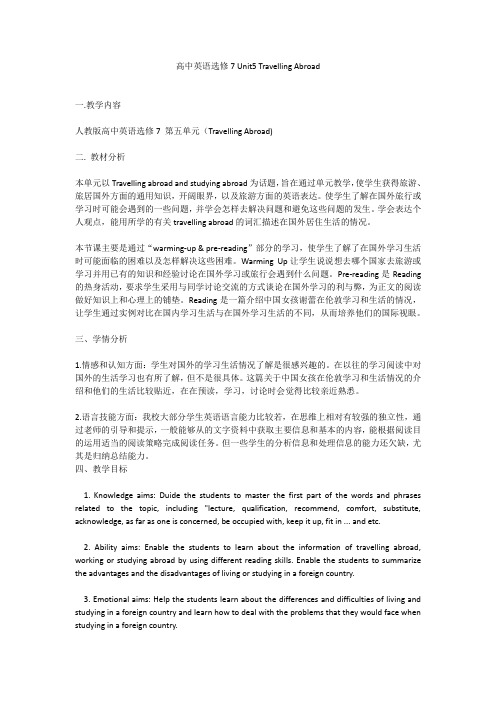
高中英语选修7 Unit5 Travelling Abroad一.教学内容人教版高中英语选修7 第五单元(Travelling Abroad)二. 教材分析本单元以Travelling abroad and studying abroad为话题,旨在通过单元教学,使学生获得旅游、旅居国外方面的通用知识,开阔眼界,以及旅游方面的英语表达。
使学生了解在国外旅行或学习时可能会遇到的一些问题,并学会怎样去解决问题和避免这些问题的发生。
学会表达个人观点,能用所学的有关travelling abroad的词汇描述在国外居住生活的情况。
本节课主要是通过“warming-up & pre-reading”部分的学习,使学生了解了在国外学习生活时可能面临的困难以及怎样解决这些困难。
Warming Up让学生说说想去哪个国家去旅游或学习并用已有的知识和经验讨论在国外学习或旅行会遇到什么问题。
Pre-reading是Reading 的热身活动,要求学生采用与同学讨论交流的方式谈论在国外学习的利与弊,为正文的阅读做好知识上和心理上的铺垫。
Reading是一篇介绍中国女孩谢蕾在伦敦学习和生活的情况,让学生通过实例对比在国内学习生活与在国外学习生活的不同,从而培养他们的国际视眼。
三、学情分析1.情感和认知方面:学生对国外的学习生活情况了解是很感兴趣的。
在以往的学习阅读中对国外的生活学习也有所了解,但不是很具体。
这篇关于中国女孩在伦敦学习和生活情况的介绍和他们的生活比较贴近,在在预读,学习,讨论时会觉得比较亲近熟悉。
2.语言技能方面:我校大部分学生英语语言能力比较若,在思维上相对有较强的独立性,通过老师的引导和提示,一般能够从的文字资料中获取主要信息和基本的内容,能根据阅读目的运用适当的阅读策略完成阅读任务。
但一些学生的分析信息和处理信息的能力还欠缺,尤其是归纳总结能力。
四、教学目标1. Knowledge aims: Duide the students to master the first part of the words and phrases related to the topic, including "lecture, qualification, recommend, comfort, substitute, acknowledge, as far as one is concerned, be occupied with, keep it up, fit in ... and etc.2. Ability aims: Enable the students to learn about the information of travelling abroad, working or studying abroad by using different reading skills. Enable the students to summarize the advantages and the disadvantages of living or studying in a foreign country.3. Emotional aims: Help the students learn about the differences and difficulties of living and studying in a foreign country and learn how to deal with the problems that they would face when studying in a foreign country.五、教学重点及难点1. Widen the vocabulary range. Develop the students’reading skills namely skimming and scanning and so on.2. Guide the students to summarize the benefits and difficulties of living in a foreign country.六. 教学方法1.演示法:通过相关的图片、PPT等网络多媒体辅助显示给学生看,便于学生对基础知识和背景知识的把握,并从旧知识中获得启迪,从而达到解决问题的目的。
【2018年秋季课程人教版高三英语】选修七第五单元教案

【2018年秋季课程人教版高三英语】选修七第五单元教案教学难点1、单词,短语正确使用2、单词短语辨义的考点及易错点教学过程一、课程导入二、复习预习复习上节课主要内容三、知识讲解知识点1:词语辨析1.qualification n. 资格, 条件qualify v. (使)具有资格,2. preparation n. 准备, 预备prepare v. 准备, 预备,3. comfortable adj. 舒适的comfort n. 安慰v. 安慰, 使(痛苦等)缓和4. require v.需要, 要求, 命令requirement n. 需求, 要求, 必要条件ern v. 统治, 支配管理government n. 政府,【练习】根据句子结构,用括号内所提供词的适当形式填空1) ---Are you sure he is ________ to drive a car?---Yes. He got his driving _______ before he ______ as a teacher.(qualification)2) Every family is busy ______ for the Spring Festival for there are lots of _______ to do. (preparation)3) Anyone who launches a war is ______ and is _______ by people who love peace all around the world. (awe)4) The _______ of energy will help us research the way to save and_______ the energy. (conserve)5) Though the soup is _______, I’ve lost my sense of ______ and it____just like ______water.(taste)keys:1) qualified; qualification; qualified 2) preparing; preparation 3) awesome; awed 4) conservation; conserve 5) tasty; taste; tastes; tasteless知识点2:词语辨析1). board/aboard/abroad/broad【解释】board n.(木, 纸)板;滑水板vt.用板铺;用板盖; 上(船、车、飞机)船舷; 甲板;aboard adv. &prep. 在船(飞机、车)上, 上船(飞机、车)abroad adv.往国外, 海外,broad adj.宽的, 阔的, 广泛的adv.宽阔地【练习】选择board/aboard/abroad或broad并用其适当的形式填空1) Sometimes when decorating, we need to saw a ______ in half.2) She said good-bye to her friends and _______ a plane for New York.3) She went _______ the plane.4) During the Spring Festival, many people choose to travel _______5) Liu xiang is famous for his speed in hurdle at home and _______.6) The gymnastic coach has _______ shoulders.7) The robber who robbed the bank of cash ________ daylight was sentenced to death at last.Keys: 1) board 2) boarded 3) aboard 4) abroad 5) abroad 6) broad 7) broad2). get used to/be used to/used to【解释】get used to +sth./doing sth. 习惯于……(侧重于动作)be used to+sth./doing sht. 习惯于……(侧重于状态)be used to do 被用做……(被动语态)used to过去常常(强调现在不再存在)【练习】选择get used to/be used to或used to,并用其适当的形式填空1) We ________ send cards to each other by post. Now we send electronic cards in stead.2) I’m sure that he will soon __________ country life.3) Now people in city _________ shopping on the internet.4) Most of the wood there ________make furniture. Keys: 1) used to 2) get used to 3) are used to 4) is used to知识点3:重点词汇1. qualification n.资格;证明[重点用法]qualify v. (使)具有资格,证明合格qualification as当任(职务等)的资格qualification for在(某方面)具有资格取得资格,合格qualify as取得……资格qualify for有……资格,有……权;应得;使合格,使能担任,使适合于qualify sb.to do sth.使某人有资格做某事[典例]1) What’s the qualification as a doctor?取得当一名医生的资格是什么?2) What qualifications have you got to have for this job? 申请这个工作你得要具有的条件是什么?3) Do you qualify for the vote? 你有投票资格吗?4) I hope to qualify as a teacher. 我希望取得教师资格。
人教版高中英语选修7教案Unit 5 Traveling abroad

人教版高中英语选修7教案Unit 5 Traveling abroad Unit Traveling abrad一、语言要点I单元要点预览(旨在让同学整体了解本单元要点)词汇部分词语辨析1bard/abard/abrad/brad 2get used t/be used t/used t 词形变化1qualifiatin n 资格, 条qualif v (使)具有资格,2 preparatin n 准备, 预备prepare v 准备, 预备,3 frtable ad 舒适的frt n 安慰v 安慰, 使(痛苦等)缓和4 require v需要, 要求, 命令requireent n 需求, 要求, 必要条gvern v 统治, 支配管理gvernent n 政府,重点单词1 qualifiatin n资格;证明2 preparatin n准备;预备3 reend vt推荐;建议4 frt n舒适;安慰vt安慰substitute n代替者;代用品vt用……代替……6 anledge vt 承认;确认;答谢7 up vt占有;占领;占据8 gvern vi≈vt统治;支配;管理9 ntradit vt 反驳;反对;否认; 与矛盾10 abundant ad丰富的, 充裕的,重点词组eep it up 保持优秀成绩;继续干下去as far as ne is nerned 就……而言settle in(迁入新居;更换工作后)安顿下ut f the questin不可能的重点句型1 “It’s nt ust stud that’s diffiult u have t get used t a hle ne a f life, hih an tae up all ur nentratin in the beginning,” exp lained Xie Lei, h had lived all her life in the sae it in hina2 I have been s upied ith r that I haven’t had tie fr sial ativities重点语法被动语态(II)(见语法专题)II 词语辨析(旨在提供完形填空所需材料)1) bard/abard/abrad/brad【解释】bard n(木, 纸)板;滑水板vt用板铺;用板盖; 上(船、车、飞机)船舷; 甲板;abard adv ≈prep 在船(飞机、车)上, 上船(飞机、车)abrad adv往国外, 海外, 找教案http://zhaiaanbrad ad宽的, 阔的, 广泛的adv宽阔地【练习】选择bard/abard/abrad或brad并用其适当的形式填空1) Seties hen derating, e need t sa a ______ in half2) She said gd-be t her friends and _______ a plane fr Ne r3) She ent _______ the plane4) During the Spring Festival, an peple hse t travel _______) Liu xiang is faus fr his speed in hurdle at he and _______6) The gnasti ah has _______ shulders7) The rbber h rbbed the ban f ash ________ dalight as sentened t death at lastes: 1) bard 2) barded 3) abard 4) abrad ) abrad 6) brad 7) brad2) get used t/be used t/used t【解释】get used t +sth/ding sth 习惯于……(侧重于动作)be used t+sth/ding sht 习惯于……(侧重于状态)be used t d 被用做……(被动语态)used t过去常常(强调现在不再存在)【练习】选择get used t/be used t或used t,并用其适当的形式填空1) e ________ send ards t eah ther b pst N e send eletrni ards in stead2) I’sure that he ill sn __________ untr life3) N peple in it _________ shpping n the internet4) st f the d there ________ae furniturees: 1) used t 2) get used t 3) are used t 4) is used t III 词性变化(旨在提供语法填空所需材料)1qualifiatin n 资格, 条qualif v (使)具有资格,2 preparatin n 准备, 预备prepare v 准备, 预备,3 frtable ad 舒适的frt n 安慰v 安慰, 使(痛苦等)缓和4 require v需要, 要求, 命令requireent n 需求, 要求, 必要条gvern v 统治, 支配管理gvernent n 政府,【练习】根据句子结构,用括号内所提供词的适当形式填空1) ---Are u sure he is ________ t drive a ar?---es He gt his driving _______ befre he ______ as a teaher(qualifiatin)2) Ever fail is bus ______ fr the Spring Festival fr there are lts f _______ t d (preparatin)3) Anne h launhes a ar is ______ and is _______ b peple h lve peae all arund the rld (ae)4) The _______ f energ ill help us researh the a t save and _______ the energ (nserve)) Thugh the sup is _______, I’ve lst sense f ______ and it ____ust lie ______ater(taste)es:1) qualified; qualifiatin; qualified 2) preparing; preparatin 3) aese; aed 4) nservatin; nserve ) tast; taste; tastes; tastelessIV 重点词汇(旨在提供综合运用所需材料)1 qualifiatin n资格;证明[重点用法]qualif v (使)具有资格,证明合格qualifiatin as当任(职务等)的资格找教案http://zhaiaanqualifiatin fr在(某方面)具有资格取得资格,合格qualif as取得……资格qualif fr有……资格,有……权;应得;使合格,使能担任,使适合于qualif sb.t d sth.使某人有资格做某事[典例]1) hat’s the qualifiatin as a dtr?取得当一名医生的资格是什么?2) hat qualifiatins have u gt t have fr this b? 申请这个工作你得要具有的条是什么?3) D u qualif fr the vte? 你有投票资格吗?4) I hpe t qualif as a teaher 我希望取得教师资格。
人教版高中英语选修7优秀教案Unit5Travelling abroadPeriod 3新
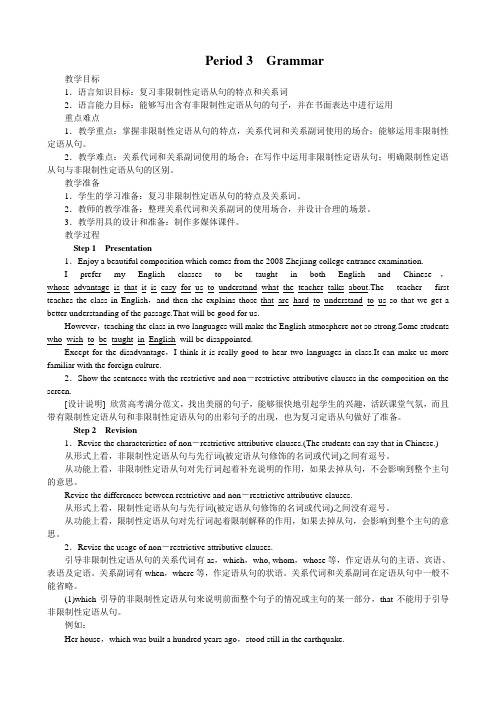
Period 3Grammar教学目标1.语言知识目标:复习非限制性定语从句的特点和关系词2.语言能力目标:能够写出含有非限制性定语从句的句子,并在书面表达中进行运用重点难点1.教学重点:掌握非限制性定语从句的特点,关系代词和关系副词使用的场合;能够运用非限制性定语从句。
2.教学难点:关系代词和关系副词使用的场合;在写作中运用非限制性定语从句;明确限制性定语从句与非限制性定语从句的区别。
教学准备1.学生的学习准备:复习非限制性定语从句的特点及关系词。
2.教师的教学准备:整理关系代词和关系副词的使用场合,并设计合理的场景。
3.教学用具的设计和准备:制作多媒体课件。
教学过程Step 1Presentation1.Enjoy a beautiful composition which comes from the 2008 Zhejiang college entrance examination.I prefer my English classes to be taught in both English and Chinese,whose_advantage_is_that_it_is_easy_for_us_to_understand_what_the_teacher_talks_about.The teacher first teaches the class in English,and then she explains those that_are_hard_to_understand_to_us so that we get a better understanding of the passage.That will be good for us.However,teaching the class in two languages will make the English atmosphere not so strong.Some students who_wish_to_be_taught_in_English_will be disappointed.Except for the disadvantage,I think it is really good to hear two languages in class.It can make us more familiar with the foreign culture.2.Show the sentences with the restrictive and non-restrictive attributive clauses in the composition on the screen.[设计说明] 欣赏高考满分范文,找出美丽的句子,能够很快地引起学生的兴趣,活跃课堂气氛,而且带有限制性定语从句和非限制性定语从句的出彩句子的出现,也为复习定语从句做好了准备。
选修七第五单元 教案

4.重点语法:过去分词(短语)作状语;动词短语。
教学目标
1.掌握重点单词短语和句型。
2.掌握重点语法。
教学重点
本模块以少数民族的文化为主题,介绍云南风貌及其少数民族。通过听、说等活动,复习和学习一些描述少数民族风情、服装和地理位置等信息的词汇,获取文化信息,并正确运用询问信息的表达;通过Reading的学习,了解丽江古城、纳西族、白族的文化风情,并在阅读过程中根据文字表面意思对其深层含义作出正确合理的推断;通过Writing的练习,对收集到的有关某一个或几个少数民族的信息进行加工和组合,用自己的语言描述其文化风情;复习过去分词充当状语的用法,并复习come across,make up,fall for等动词短语。
36. n.(一种语言的)书写字母
37. interj.(突然感到疼痛时的叫声)哎呦
38. n.榔头,锤子
39. adj.瘸的,跛的
40. v.单足蹦跳
41. n.轮胎
42. adj.牢固的,稳固的
43. n.热带丛林
44. n.(一个)人
45. adj.遥远的疏远的
46. n.(常用于干农活的)阉牛
2.重点词组:in use, use up, make use of = take advantage of, of (no) use, bring /put sth. into use, come into use, seat belt = life belt = safety belt, have a population of , It is apparent that… / clear /distinct /obvious /evident, in the distance, from the distance , keep one’s distance, keep sb. at a distance , set off = set out = start out,be in a/ the minority, be in a /the majority, be diverse from = be different from, be native to…,vary from… to…, vary with, a variety of = varieties of , run into, run after, run away, run out of, fasten… and …(together), fasten… to…, fasten on/ upon,adjust to sth/ doing sth. = adjust oneself to , make an adjustment , be furnished with,
人教版英语选修七教案:Unit5+Traveling+Abroad+Reading+for+Writing.doc
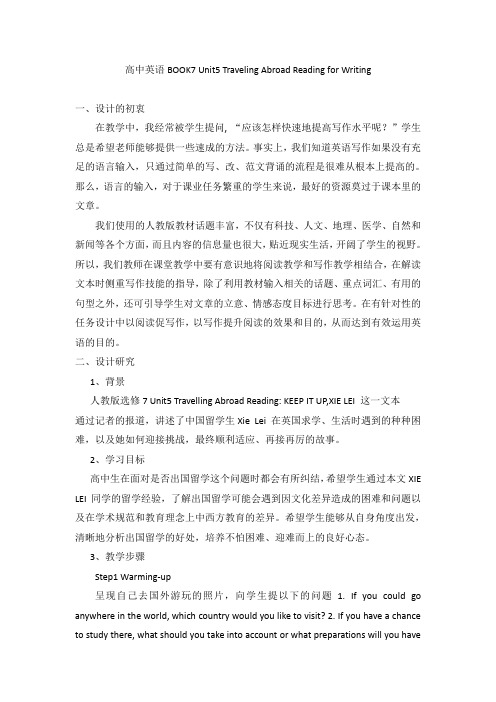
高中英语BOOK7 Unit5 Traveling Abroad Reading for Writing一、设计的初衷在教学中,我经常被学生提问, “应该怎样快速地提高写作水平呢?”学生总是希望老师能够提供一些速成的方法。
事实上,我们知道英语写作如果没有充足的语言输入,只通过简单的写、改、范文背诵的流程是很难从根本上提高的。
那么,语言的输入,对于课业任务繁重的学生来说,最好的资源莫过于课本里的文章。
我们使用的人教版教材话题丰富,不仅有科技、人文、地理、医学、自然和新闻等各个方面,而且内容的信息量也很大,贴近现实生活,开阔了学生的视野。
所以,我们教师在课堂教学中要有意识地将阅读教学和写作教学相结合,在解读文本时侧重写作技能的指导,除了利用教材输入相关的话题、重点词汇、有用的句型之外,还可引导学生对文章的立意、情感态度目标进行思考。
在有针对性的任务设计中以阅读促写作,以写作提升阅读的效果和目的,从而达到有效运用英语的目的。
二、设计研究1、背景人教版选修7 Unit5 Travelling Abroad Reading: KEEP IT UP,XIE LEI 这一文本通过记者的报道,讲述了中国留学生Xie Lei 在英国求学、生活时遇到的种种困难,以及她如何迎接挑战,最终顺利适应、再接再厉的故事。
2、学习目标高中生在面对是否出国留学这个问题时都会有所纠结,希望学生通过本文XIE LEI同学的留学经验,了解出国留学可能会遇到因文化差异造成的困难和问题以及在学术规范和教育理念上中西方教育的差异。
希望学生能够从自身角度出发,清晰地分析出国留学的好处,培养不怕困难、迎难而上的良好心态。
3、教学步骤Step1 Warming-up呈现自己去国外游玩的照片,向学生提以下的问题 1. If you could go anywhere in the world, which country would you like to visit? 2. If you have a chance to study there, what should you take into account or what preparations will you haveto make?(Possible answer: tuition; living expenses; apply for a visa; language learning; know more about the country and their local culture and customs; mental preparation for saying goodbye to family and friends; get used to a new way of life, differences between studying at a Chinese university and studying abroad.)[设计说明]通过与学生分享出国旅游的照片,自然过渡到他们喜欢去哪个国家的问题,紧接着讨论如果可以在那个国家留学,应该考虑些什么或做些什么准备,这样就引出了本文的话题——出国留学。
选修7unit5 travelling abroad教案

Teaching plan人教版新课标教材选修模块七Unit5Travel abroadPeriod2Reading:Keep it up,Xie LeiChinese students fitting in well课堂设计设计原则本课时采用“准确简洁、实用可学”的设计原则,侧重常态教学。
与高考考纲有机结合,设计重点聚焦在以下两个方面:学生思维品质的深刻性;阅读教学的实效性。
教学内容1)对文章进行整体把握、细节和深层理解。
2)对部分语句的paraphrase.3)对主人公性格的把握。
4)对主人公经历的了解。
教学目标通过课堂限时阅读以及阅读讨论,绝大部分同学能:1)提高阅读速度。
2)加强对文章整体把握、细节和深层理解。
教学重点引导学生如何进行推理判断。
教学难点学生能够掌握文章大意,但是总结归纳的表述能力有些薄弱。
能力训练理解、归纳、运用Teaching ProcedureSteps Teacher’s Activities Students’Activities Purpose of Activities Step I.Lead in Lead-in activities:①Brain-storming:What should weconsider before wedecide to travelabroad?The teacher will showsome items.②Have anunderstanding ofCulture Shock.③Have anunderstanding of thetitle Xie Lei fittingin well.The whole class activities①To Lead into thetopic of today andto make theteachingobjective clear.②Help the studentsto learn to paymore attention tothe title duringthe readingprocess.Step II(Task1)ReadingComprehension①10minutes to read thewhole text.②Finish the followingsix multiple choices.③Check the answer The whole class activities:read the text in limitedtime and finish exercise1-6,using proper readingstrategies.1)Which aspects arementioned2)Why Xie Lei go to Britain?3).How Xie Lei tries to getused to the new life4).What to infer from thearticle?5).Where to read this text?6).The main idea of the text?①Improve theirreading speed andcomprehendingability.Question1:to get ageneral outline of the textQuestion2-4:to get somedetails of the textQuestion6:to summarizethe text②Develop theirreading strategies.Step III.(Task2) Read for discussion Read to discuss thefollowing questions.Provide help if there aresome problems,and checkthe answers.Pair work to discuss thefollowing questions:①Paraphrase②How the tutor helps XieLeibecome an autonomouslearner③Xie Lei’s personality④Choose one picture tostand for XieLei’s studyingabroad and tell your reasonbriefly①Improve theirexpression.②Develop theirimaginable thinking.③Arouse their interestin English study.Question1:to improvetheir English expressionQuestion2:a chance forthe Ss to improve theirsummarizing ability.Question3:a chance forthe Ss to improve theirsummarizing and learnfrom XieLeiQuestion4:to arousetheir interests anddevelop their imaginablethinkingStep IV. Homework Ask the students①Translate the followingphrases,referring to thetext.②Make sentences withthe expressions in bold.Do the exercise togetherThe students will beclear about theimportant phrases ofthe text and learn touse them in theirwriting.锻炼学生思维的深刻性,关注课文阅读的实效性——高二阅读课例教案设计体现人教版新课标教材选修模块七Unit5Travel abroadPeriod2Reading:Keep it up,Xie LeiChinese students fitting in well课堂设计设计原则本课时采用“准确简洁、实用可学”的设计原则,侧重常态教学。
人教版高中英语选修7Unit 5Travelling abroad教案3
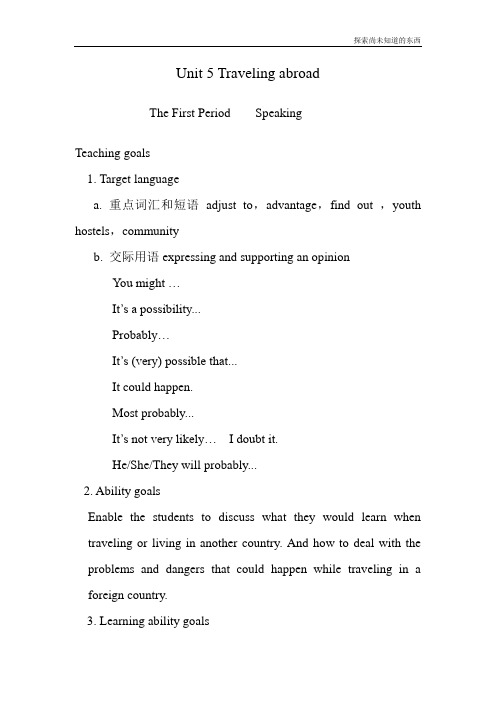
Unit 5 Traveling abroadThe First Period SpeakingTeaching goals1. Target languagea. 重点词汇和短语adjust to,advantage,find out ,youth hostels,communityb. 交际用语expressing and supporting an opinionYou might …It’s a possibility...P robably…It’s (very) possible that...It could happen.Most probably...It’s not very likely… I doubt it.He/She/They will probably...2. Ability goalsEnable the students to discuss what they would learn when traveling or living in another country. And how to deal with the problems and dangers that could happen while traveling in a foreign country.3. Learning ability goalsHelp the students learn how to deal with the problem that they could meet while traveling..Teaching important pointsLet students learn to use the structures of expressing and solve the problems.Teaching difficult pointsHow to deal with the problems that are likely to happen when traveling and how to prevent them.Teaching methods1. Looking at the questions. (individuals).2. Pairs work to discuss and work in groups of four.(task-based , cooperative learning).Teaching aids1. A computer2. A projectorTeaching procedures & waysStep I Greeting and RevisionT: Good morning/afternoon, boys and girls! First, let’s check the homework.1.Check whether they have remembered the ten importantsentences.2.Check whether they have previewed the new words andexpressions in this unit.Step II Warming up*Talk about the problems with the teacher’s help.T: If you had chance to go abroad in the world, which country would you like to visit and why ? and what kind of things would you meet or learn best? Look at the problems on Page 37. You can discuss the following questions with your partner.Qs: 1.If you could go anywhere in the world, which country would you like to visit and why?2. What kind of things would you learn best by being a tourist ina country and what would you learn best by working orstudying there?3. How differences or easy do you think it is to adjust to living ortraveling in another country? What kind of differences might you experience?4. Have you talked to anyone who has spent some time inanother country? What did they find unusual or difficult about it?DiscussionSa: If I had chance to travel abroad, I’d like to visit New Zealand. It’s said that it’s a beautiful country, I’d like to enjoy the beautifulscenery in New Zealand.Sb: If I had chance, I’d like to go to America. Maybe it is better if I could work or study there, then I could learn English well.Sc: I ‘d like to go to Egypt, because I want to know about the ancient culture.T: What kind of things would you learn best by being a tourist in a country and what would you learn best by working or studying there?Sa: When we travel to another country, maybe we could know about the architecture of the country, the beautiful scenery, the economic situation and so on.Sb: When we work or study in the country, maybe we could know more about the manners and customs of the country. We could learn the standard English better, we could communicate with the local people to improve our English.Sc: If we could live with the local people, we could know the proprieties of the country, know more slang, know the difference in time, food, transportation etc. between the two countries.T: Very good. You can think so many things. Have you talked to anyone who has spent some time in another country? What did they find unusual or difficult about it?Ss: Well, I have talked to my friend who had been to a foreigncountry, he told me something different or interesting in the foreign country. For example, in India, most people don’t eat meat, especial beef, they like to eat vegetables and fruits, so if you invite an Indian for dinner, never order steak for them.Step III SpeakingT: Well, we talked about the things that we could learn while we traveling or studying in a foreign country. Then, what kind of problems or dangers would happen while traveling in a foreign country? Now, turn at page to P82, try to list the dangers and problems, then discuss ways you could prevent these things happening in groups. The following sentence patterns are helpful for you:You might… Most probably, …It’s a possibility…It’s likely/unlikely that…Probably, … It’s not very likely… I doubt it.It’s (very) possible… He/She/They will probably.It could happen.(After a few minutes)T: Well, are you ready ? Who’d like to show us your opinion?Sa: While traveling, it’s possible that you could lose you way, because you don’t know the country very well. To prevent this:◆You’d better take a map of the country with you.◆Don’t leave alone without saying a word.◆Pay attention to the conspicuous signs, for example, somefamous buildings, some special road signs so that you can ask the way while you are lost.Sb: It’s likely that we could meet malefactors--- robber, thief or others. Probably, we will be hurt. To prevent this:◆Don’t show your valuable belongings to others.◆You’d better go along with other people.◆Should you face dangers, connect the police.Sc: It’s (very) possible that we could have difficulty in communicating with the local people. To prevent this:◆Try to grasp the simple and basic communicated language◆Try to know about the manners and customs of the country◆Try to be familiar with formality in everyday lifeStep IV TalkingT: OK! So much for the questions. You did a very good job, I’m sure that you have known how to deal with the problems while traveling or studying in a foreign country. If we wanted travelalone with a little money, could you find a good way to save money?Sa: Maybe we could travel on foot or by second-class rail.Sb: We could stay at the small inn to save money, but maybe the situation there is not good.T: Well, there is a good and not expensive place for travellers--- Youth Hostels, Hostels provide clean safe place to stay and have community kitchens. Now, let’s r ead something about Youth Hostels and discuss the questions in groups.(5 minutes later.)T: OK. Let’s look at the questions. Are youth hostels expensive or cheap to stay in?Ss: They are cheap. They offer quality accommodation at low cost. T: Yes. And how many people share a bedroom in a hostel?Ss: There are 4,5, or 6 people.T: What is the advantage of staying in a place with a kitchen when you are traveling?Ss: If there were a kitchen in the hostel, I could cook by myself, it’s It is good economy to cook on my own.T: What is the advantage of having a Youthpass?Ss: Youthpass offers travelers cheap train fares in most European countries. It can make you maximize your time and minimize yourcost.T: How old must you be to get a Youthpass?Ss: For those under age 26 on their first day of travel.T: Why is it a good idea to buy travel insurance?Ss: Because while traveling, we may face unexpected illness or accident, no matter where you go to in the world, the cost of medical treatment can be very high, if you buy travel insurance, it can afford all medical treatment of you while traveling abroad.T: Then would you enjoy staying in a youth hostel? Why?Ss: Though there are many advantages of staying in a youth hostel, I still like to travel in collective tour. Tourists can help each other in case of an emergency.Ss: Well, I like youth hostel very much. Because I like traveling on my own, I like to enjoy the sense of freedom, I can do whatever I like. Also, it’s convenient for traveler to stay in youth hostel.T: Good. There is little time, let’s look at our homework.Step V Homework1.Learn the new words and expressions by heart2.Let students talk about their experiences of travelling FEEDBACK:学生评价较高,学生普遍反映现在有更多机会用英语交流,锻炼了能力也树立了信心。
人教版高中英语选修7《Unit 5 Travelling abroad》教案2篇

人教版高中英语选修7《Unit 5 Trav elling abroad》教案2篇The teaching plan of unit 5 travelling abroad编订:JinTai College人教版高中英语选修7《Unit 5 Travelling abroad》教案2篇前言:英语作为在许多国际组织或者会议上都是必需语言,几乎所有学校选择英语作为其主要或唯一的外语必修课。
英语教学涉及多种专业理论知识,包括语言学、第二语言习得、词汇学、句法学、文体学、语料库理论、认知心理学等内容。
本教案根据英语课程标准的要求和教学对象的特点,将教学诸要素有序安排,确定合适的教学方案的设想和计划、并以启迪发展学生智力为根本目的。
便于学习和使用,本文档下载后内容可按需编辑修改及打印。
本文简要目录如下:【下载该文档后使用Word打开,按住键盘Ctrl键且鼠标单击目录内容即可跳转到对应篇章】1、篇章1:人教版高中英语选修7《Unit 5 Travelling abroad》教案2、篇章2:人教版高中英语选修7《Unit 5 Travelling abroad》教案篇章1:人教版高中英语选修7《Unit 5 Travelling abroad》教案教学准备教学目标1.Students are able to summarize the general ideas of each paragraph by reading the text.2.Students can summarize the benefits and the difficulties of life abroad by reading again3.Students can learn about the Xie Lei’s character by discussion.4.Students can master some difficult words, phrases and sentences by explanation.教学重难点1.Students are able to summarize the general ideas of each paragraph by reading the text.2.Students can summarize the benefits and the difficulties of life abroad by reading again 教学过程教学过程Step 1 Warming upShow the beautiful scenery of other countries to attract students' attention,including the pyramids of Egypt,London Bridge,Sydney Opera House,Eiffel Tower,,Stonehenge,etc.Questions:1.Do you like traveling?2.If you have chance to go abroad, where would you like to go for travel?设计意图:课堂以欣赏国外优美的风光, 在给学生以极大的视觉享受的同时,激起他们对于出国旅行,学习的向往,至于最想去的国家或地方更能让他们有话可说。
【人教版高三英语】选修七第五单元教案
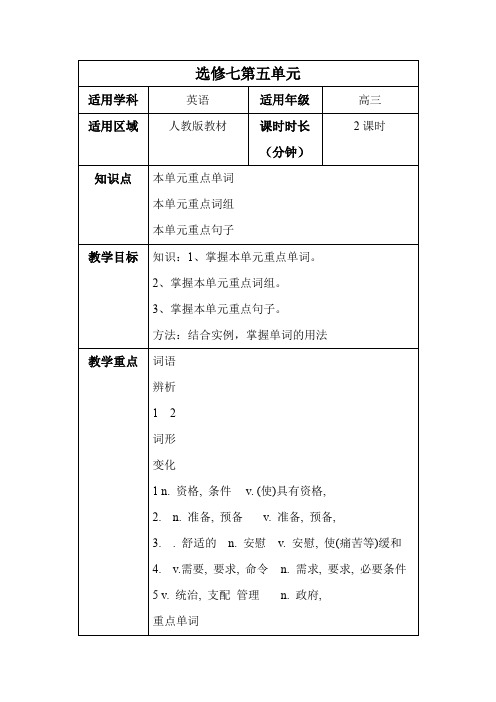
教学过程一、课程导入二、复习预习复习上节课主要内容三、知识讲解知识点1:词语辨析1 n. 资格, 条件v. (使)具有资格,2. n. 准备, 预备v. 准备, 预备,3. . 舒适的n. 安慰v. 安慰, 使(痛苦等)缓和4. v.需要, 要求, 命令n. 需求, 要求, 必要条件5 v. 统治, 支配管理n. 政府,【练习】根据句子结构,用括号内所提供词的适当形式填空1) a . a .()2) . ()3) a . ()4) . ()5) , I’ .():1) ; ; 2) ; 3) ; 4) ; 5) ; ; ;知识点2:词语辨析1).【解释】n.(木, 纸)板;滑水板.用板铺;用板盖; 上(船、车、飞机)船舷; 甲板;. . 在船(飞机、车)上, 上船(飞机、车).往国外, 海外,.宽的, 阔的, 广泛的.宽阔地【练习】选择或并用其适当的形式填空1) , a .2) a .3) .4) ,5) .6) .7) .: 1) 2) 3) 4) 5) 6) 7)2).【解释】. 习惯于……(侧重于动作). 习惯于……(侧重于状态)被用做……(被动语态)过去常常(强调现在不再存在)【练习】选择或,并用其适当的形式填空1) . .2) I’m .3) .4) .: 1) 2) 3) 4)知识点3:重点词汇1. n.资格;证明[重点用法]v. (使)具有资格,证明合格当任(职务等)的资格在(某方面)具有资格取得资格,合格取得……资格有……资格,有……权;应得;使合格,使能担任,使适合于..使某人有资格做某事[典例]1) ’s a ?取得当一名医生的资格是什么?2) ? 申请这个工作你得要具有的条件是什么?3) ? 你有投票资格吗?4) I a . 我希望取得教师资格。
5) A . 你的英语程度教书不够资格。
[练习] 汉译英1) 经过大学四年的学习,他终于取得了当律师的资格。
2) 一纸大学文凭并不意味着能让你有获得这份工作的资格。
(完整版)高中英语人教版选修7Unit5TravellingabroadGrammar教案(系列一)

选修七Unit 5 Travelling AbroadPeriod 3 GrammarI. Teaching aims:1. Ask the ss to find 5sentences in which non-restrictive attributive clause is included2. To learn the non-restrictive attributive clause3. Enable the ss to consolidate the grammar.II. ProceduresStep1. Find 5 sentences in which non-restrictive attributive clauses are used from the text:1.Xie Lei, who is 21 years old, has come to our university to study for a business qualification.2. She is halfway through the preparation year, which most foreign students complete before applying for adegree course.3. You’ve to get used to a whole new way of life, which can take up all your concentration in the beginning.4. Living with host families, in which there may be other college students, gives her the chance to learn moreabout the new culture.5. He wanted to know what I thought, which confused me because I thought that the author of the articleknew far more than I did.Step2.非限定性定语从句定语从句分为限制性定语从句(restrictive)和非限制性定语从句(non- restrictive )The teacher told me that Tom was the only person that I could depend on. 老师告诉我说汤姆是我唯一的可以依靠的人。
人教版高中英语选修7优秀教案Unit5Travelling abroadPeriod 4新
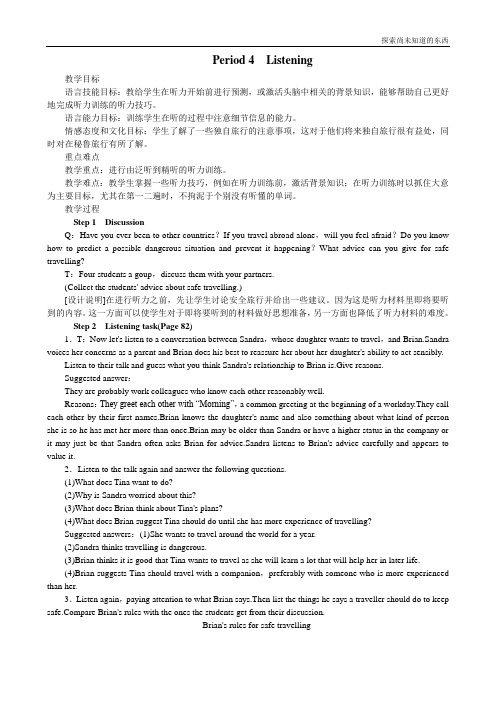
Period 4Listening教学目标语言技能目标:教给学生在听力开始前进行预测,或激活头脑中相关的背景知识,能够帮助自己更好地完成听力训练的听力技巧。
语言能力目标:训练学生在听的过程中注意细节信息的能力。
情感态度和文化目标:学生了解了一些独自旅行的注意事项,这对于他们将来独自旅行很有益处,同时对在秘鲁旅行有所了解。
重点难点教学重点:进行由泛听到精听的听力训练。
教学难点:教学生掌握一些听力技巧,例如在听力训练前,激活背景知识;在听力训练时以抓住大意为主要目标,尤其在第一二遍时,不拘泥于个别没有听懂的单词。
教学过程Step 1DiscussionQ:Have you ever been to other countries?If you travel abroad alone,will you feel afraid?Do you know how to predict a possible dangerous situation and prevent it happening?What advice can you give for safe travelling?T:Four students a goup,discuss them with your partners.(Collect the students' advice about safe travelling.)[设计说明]在进行听力之前,先让学生讨论安全旅行并给出一些建议。
因为这是听力材料里即将要听到的内容。
这一方面可以使学生对于即将要听到的材料做好思想准备,另一方面也降低了听力材料的难度。
Step 2Listening task(Page 82)1.T:Now let's listen to a conversation between Sandra,whose daughter wants to travel,and Brian.Sandra voices her concerns as a parent and Brian does his best to reassure her about her daughter's ability to act sensibly.Listen to their talk and guess what you think Sandra's relationship to Brian is.Give reasons.Suggested answer:They are probably work colleagues who know each other reasonably well.Reasons:They greet each other with “Morning”,a common greeting at the beginning of a workday.They call each other by their first names.Brian knows the daughter's name and also something about what kind of person she is so he has met her more than once.Brian may be older than Sandra or have a higher status in the company or it may just be that Sandra often asks Brian for advice.Sandra listens to Brian's advice carefully and appears to value it.2.Listen to the talk again and answer the following questions.(1)What does Tina want to do?(2)Why is Sandra worried about this?(3)What does Brian think about Tina's plans?(4)What does Brian suggest Tina should do until she has more experience of travelling?Suggested answers:(1)She wants to travel around the world for a year.(2)Sandra thinks travelling is dangerous.(3)Brian thinks it is good that Tina wants to travel as she will learn a lot that will help her in later life.(4)Brian suggests Tina should travel with a companion,preferably with someone who is more experienced than her.3.Listen again,paying attention to what Brian says.Then list the things he says a traveller should do to keep pare Brian's rules with the ones the students get from their discussion.Brian's rules for safe travelling________________________________________________________________________________________________________________________________________________________________________________________________________________________________________________________________________________________________________________________________________________________________________________________________________________________________________________________________________________________________________________________________________________________________________________________________Suggested answers:*Research the places you are going to visit.*Pay attention to what is happening around you.*Ask the locals for advice and follow it.*Observe how the people around you behave towards you.*Learn how to tell who you can and can't trust.*At first travel with a more experienced companion.[设计说明]听完第一遍对话后,要求学生推测对话的两个人的关系,然后再注意细节问题的答案,还是体现了由大到小、由粗到细的原则,也符合人们的感知规律。
高中英语人教版选修7 教学设计 Unit 5

the ability of reading and writing of students. The book includes a large number of new words, which are difficult for my students to understand. Therefore, it is important for them to preview the new words and the reading parts. The English of my students is poor. So it is difficult for them to get the main idea of the reading.【知识目标】1. 四会词汇board, cafeteria, lecture, qualification, preparation, recommend, shopkeeper, comfort, substitute, academic, requirement, tutor, numb, acknowledge, occupy, hopefully, enterprise, succeed, comment, passport, visa, agent, parallel, abundant, govern, destination2. 认读词汇summarize, Lima, Cuzco, the Andes, Peru, Lia, Lake Titicaca, Inca Empire, Machu Picchu, Puno, the Amazon Jungle3. 词组adjust to , keep it up , fit in, (get/be) used to, as far as one is concerned, feel at home, travel agent, settle in4.重点词汇board, preparation, recommend, substitute, occupy, enterprise, comment, destination5. 重点句式It was the first time she had ever left her home country, … P38Xie Lei , who is 21 years old, has come to our universityto complete a business qualification. P38It’s not just study that’s difficult. You have to get used toa whole new way of life, which can take up all your …. P38I have been so occupied getting used to everythingthat I haven’t had time for social activities. …. P39I’m going to join a few university clubs and hopefullyI’ll meet some people I have things in common with. … P39Why does Lia prefer to…?I like/don’t like doing/ to do…I prefe r to…【能力目标】Enable Ss to know something about volunteer and Jo’s work in PNG as a volunteer teacher.Help Ss to learn about PNG and find out more information about the country through internet.【情感目标】Make Ss know what is a volunteer and the spirit of volunteers.Get the Ss to realize that they should make the most of what they own and do something for the poorHelp them realize the importance of sharing.【教学重点】Talk about travel or live in another countryPractise expressing and supporting an opinionRevise the Attributive Clause (non-restrictive)Write a letter to a penfriend.【教学难点】How to revise the Attributive Clause(non-restrictive).How to improve communication skills.How to write a letter.Multimedia。
人教版高中英语选修7《Unit5Travellingabroad》教案

人教版高中英语选修7《Unit 5Travelling abroad》教案人教版高中英语选修7《Unit 5 Travelling abroad》教案【一】教学准备教学目标1.Students are able to summarize the general ideas of each paragraph by reading the text.2.Students can summarize the benefits and the difficulties of life abroad by reading again3.Students can learn about the Xie Leis character by discussion.4.Students can master some difficult words, phrases and sentences by explanation.教学重难点1.Students are able to summarize the general ideas of each paragraph by reading the text.2.Students can summarize the benefits and the difficulties of life abroad by reading again 教学过程教学过程Step 1 Warming upShow the beautiful scenery of other countries to attract students' attention,including the pyramids of Egypt,London Bridge,Sydney Opera House,Eiffel Tower,,Stonehenge,etc.Questions:1. Do you like traveling?2. If you have chance to go abroad, where would you like to go for travel?设计意图:课堂以欣赏国外优美的风光, 在给学生以极大的视觉享受的同时,激起他们对于出国旅行,学习的向往,至于最想去的国家或地方更能让他们有话可说。
- 1、下载文档前请自行甄别文档内容的完整性,平台不提供额外的编辑、内容补充、找答案等附加服务。
- 2、"仅部分预览"的文档,不可在线预览部分如存在完整性等问题,可反馈申请退款(可完整预览的文档不适用该条件!)。
- 3、如文档侵犯您的权益,请联系客服反馈,我们会尽快为您处理(人工客服工作时间:9:00-18:30)。
教学过程一、课程导入二、复习预习复习上节课主要内容三、知识讲解知识点1:词语辨析1.qualification n. 资格, 条件qualify v. (使)具有资格,2. preparation n. 准备, 预备 prepare v. 准备, 预备,3. comfortable adj. 舒适的comfort n. 安慰v. 安慰, 使(痛苦等)缓和4. require v.需要, 要求, 命令requirement n. 需求, 要求, 必要条件ern v. 统治, 支配管理government n. 政府,【练习】根据句子结构,用括号内所提供词的适当形式填空1) ---Are you sure he is ________ to drive a car?---Yes. He got his driving _______ before he ______ as a teacher.(qualification)2) Every family is busy ______ for the Spring Festival for there are lots of _______ to do. (preparation)3) Anyone who launches a war is ______ and is _______ by people who love peace all around the world. (awe)4) The _______ of energy will help us research the way to save and_______ the energy. (conserve)5) Though the sou p is _______, I’ve lost my sense of ______ and it____just like ______water.(taste)keys:1) qualified; qualification; qualified 2) preparing; preparation 3) awesome; awed 4) conservation; conserve 5) tasty; taste; tastes; tasteless 知识点2:词语辨析1). board/aboard/abroad/broad【解释】board n.(木, 纸)板;滑水板vt.用板铺;用板盖; 上(船、车、飞机)船舷; 甲板;aboard adv. &prep. 在船(飞机、车)上, 上船(飞机、车)abroad adv.往国外, 海外,broad adj.宽的, 阔的, 广泛的adv.宽阔地【练习】选择board/aboard/abroad或broad并用其适当的形式填空1) Sometimes when decorating, we need to saw a ______ in half.2) She said good-bye to her friends and _______ a plane for New York.3) She went _______ the plane.4) During the Spring Festival, many people choose to travel _______5) Liu xiang is famous for his speed in hurdle at home and _______.6) The gymnastic coach has _______ shoulders.7) The robber who robbed the bank of cash ________ daylight was sentenced to death at last.Keys: 1) board 2) boarded 3) aboard 4) abroad 5) abroad 6) broad 7) broad2). get used to/be used to/used to【解释】get used to +sth./doing sth. 习惯于……(侧重于动作)be used to+sth./doing sht. 习惯于……(侧重于状态)be used to do 被用做……(被动语态)used to过去常常(强调现在不再存在)【练习】选择get used to/be used to或used to,并用其适当的形式填空1) We ________ send cards to each other by post. Now we send electronic cards in stead.2) I’m sure that he will soon __________ country life.3) Now people in city _________ shopping on the internet.4) Most of the wood there ________make furniture.Keys: 1) used to 2) get used to 3) are used to 4) is used to知识点3:重点词汇1. qualification n.资格;证明[重点用法]qualify v. (使)具有资格,证明合格qualification as当任(职务等)的资格qualification for在(某方面)具有资格取得资格,合格qualify as取得……资格qualify for有……资格,有……权;应得;使合格,使能担任,使适合于qualify sb.to do sth.使某人有资格做某事[典例]1) What’s the qualification as a doctor?取得当一名医生的资格是什么?2) What qualifications have you got to have for this job? 申请这个工作你得要具有的条件是什么?3) Do you qualify for the vote? 你有投票资格吗?4) I hope to qualify as a teacher. 我希望取得教师资格。
5) A degree in English does not qualify you to teach English. 你的英语程度教书不够资格。
[练习] 汉译英1) 经过大学四年的学习,他终于取得了当律师的资格。
___________________________________________________________________________________2) 一纸大学文凭并不意味着能让你有获得这份工作的资格。
___________________________________________________________ ________________________Keys: 1) After four years’ studying in college, he managed to get the qualification as a lawyer. 2) Acollege diploma doesn’t mean that it can qualify you to take up the job. preparation n.准备;预备[重点用法]prepare vt. & vi.预[准,筹]备,布置,为…铺路;配制;调制;使作准备;温习be in preparation (for) 在……准备中;作为……的准备make preparations against为对付……做准备make preparations for为……做准备be(well)prepared for[to do]…对…有所准备(处于对…有所准备的意识) prepare sth.against准备(…)应付…prepare sb.for让……为了…作准备prepare the ground for为…铺平路;为…打下基础[典例]1) Mother is now preparing food for dinner.妈妈正在为晚餐准备食物。
2) The students are now preparing for the exams.学生们正为考试做准备。
3) The teachers are now preparing their lessons.老师们在备课。
[练习]根据括号里的汉语补全句子。
1) The chemist ______________ the disease case.(这药剂师正为这病例配制药。
)2) What we are engagedin_________________________________________.(我们现在所从事的就是为这目标铺平道路。
)Keys: 1)is preparing medicine for 2)is to prepare the ground for this aimrecommend vt.推荐;建议[重点用法]recommendation n.推荐,介绍(信),劝告,建议on one's recommendation经某人介绍follow sb.’s recommendations听从某人的劝告recommendation(s)for.……的推荐write/give sb.a recommendation为某人写推荐信/介绍信提示1)该词意为“建议”时,注意三种句型:(1) recommend+(sb's)doing;(2) recommend +that(从句) (从句用虚拟,由should+动词原形构成);(3) recommend +sb. to do2)该词做“推荐;介绍”时,常用句型是:(1) recommend sb.sth.(2) recommend sth.for(doing) sth.[典例]1) Can you recommend me a good novel? 能给我推荐一本好小说吗?2) What would you recommend for the ink stains?有什么办法能除掉墨水汁吗?3) It is recommended in the regulations that you(should)not tell others the password of your e-mailaccount. 条款有提示,不要将邮箱密码透露给别人。
